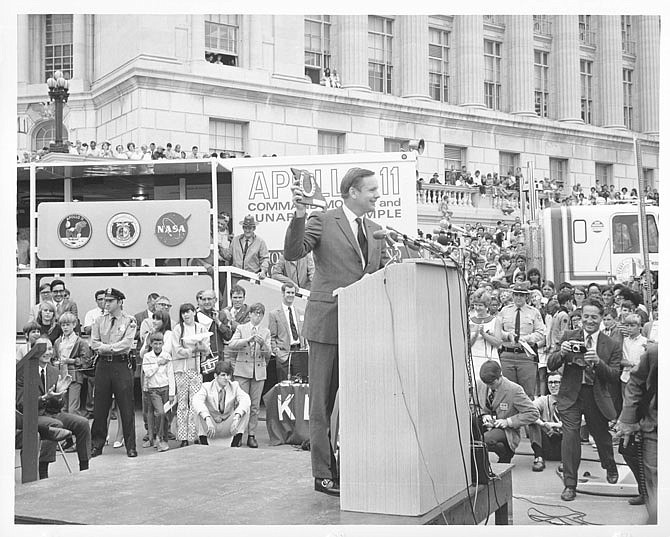As the world remembers today as the 50th anniversary of men walking on the moon for the first time, Jefferson City residents may be thinking of a connected but less-publicized event.
Today also is the 49th anniversary of the three Apollo 11 astronauts - and their command module - visiting Jefferson City on July 20, 1970.
"At some point, I was talking with the public affairs office at NASA, and they wondered if - since the capsule already was here - if we'd be interested in having the astronauts, too," recalled Jerry Bryan, who then was Gov. Warren Hearnes' spokesman.
He got a brief chance to meet with the three astronauts - Neil Armstrong, Buzz Aldrin and Michael Collins.
"There was hand-shaking," he recalled, and a few moments of polite conversation.
"I think, for the general public, it was very much like having rock stars" visit the Missouri Capitol, Bryan said.
But, for people like him who worked in political circles, "it was like greeting other big names. Certainly with those three astronauts, the thing, I guess, that struck me was that they had a strength and command presence."
Clyde Lear, then a reporter for KLIK Radio, and later a co-founder of the Learfield broadcasting company, said in an interview this week: "They were 'real people,' and I guess I was impressed with how ruggedly young they were. They were in good shape, and it was so fun to see them. It was a big deal."
Was it like being visited by rock stars?
"I didn't have that impression of them," Lear said. "My impression was that they were like down-to-earth engineers."
Lear said his boss at the time - now-retired broadcaster and historian Bob Priddy - was KLIK's news director and had set up a small network of stations around the state to carry a live broadcast of the astronauts' visit.
Lear did not tell this story, but Priddy reported: "Clyde was with the guys when they went on the trailer to see their capsule for the first time in a year.
"He asked one of them how it looked. And the answer was something like, 'Just fine.'"
Priddy told the News Tribune his thoughts about the importance of that big day included: "The fact that we were fortunate enough, just by circumstance, to have the capsule in Jefferson City on the anniversary, and then have them come to Jefferson City.
"And then I got to sit there, 15 feet away from these guys, and listen to them speak to the crowd. That was pretty special."
When asked if he thought it was like a visit from rock stars, Priddy said: "It must have been, because I've seen crowd estimates of 18,000 people at the Capitol that day."
That's a larger crowd than most inaugurations, as well as Gov. Mel Carnahan's outdoor funeral in October 2000.
Lear explained: "We have a lot of inaugurations in Jefferson City. They come every four years. But that was something that, I think, everybody knew was special. (You knew) it wouldn't happen again, and if you wanted to see these boys, this was the only time you would get to."
He remembered the guest platform being set on the east side of the Capitol's front steps, with people spread to the west and to the north toward the river.
"They had loudspeakers set up for them to hear, but there were a lot of people who never saw the guys because they were too far away," Priddy recalled. "But they at least heard them talk."
Priddy thinks Collins - the lunar module commander who stayed above the lunar surface while the other two walked below - was the best speaker of the day.
"He was probably the more philosophical of the three," Priddy said. "Collins, I think, was the one who was most introspective and, I thought, the most reflective of that experience."
Priddy, Bryan and Lear all talked about the boost the six moon landings gave to an American society that was torn by the Civil Rights movement, the Vietnam War and other issues.
Priddy noted, shortly after the Apollo 11 astronauts were in Missouri, NASA cut three of the planned moon landings, leaving Apollo 17 as the last landing mission.
Lear remembered the day 49 years ago as being typically hot for July in Mid-Missouri.
Bryan, who served as the event's master of ceremonies, added: "I remember standing there in rather bright, July sunshine."
The crowd included politicians, like Gov. Hearnes, Lt. Gov. Bill Morris, Auditor Haskell Holman and Secretary of State James Kirkpatrick, as well as Jefferson City Mayor John Christy.
What should our remembrances of the landing in 1969, and the astronauts' Jefferson City visit a year later, mean to us in the future?
Priddy said one of the astronauts who visited Jefferson City later made a point that they "were all part of a generation of people who were in their 20s and early 30s at the time, (including) the scientists and technicians on the ground who put these missions together, who believed that nothing is impossible."
And Bryan said he thinks most focus on Neil Armstrong's statement as he touched the moon: "That's one small step for man, one giant leap for mankind."
Bryan, who helps run a consulting service in St. Louis called WebSanity, added: "I think that today's generation, when they've heard about going to space, they've heard that phrase. And it's a memorable one."

